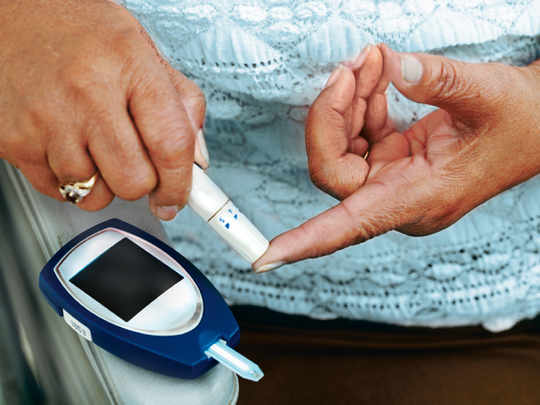
Dubai: Deaths related to diabetes will continue to double until 2030 globally, according to the latest World Health Organisation (WHO) figures. The projection is particularly alarming for the UAE which has one of the highest rates of diabetes prevalence in the world.
Experts fear the risk of death from diabetes in the UAE is high and the high prevalence of the disease represents a ticking health time-bomb.
Statistics by the Dubai Health Authority (DHA) peg the percentage of diabetic UAE residents — Emiratis and expatriates — at more than 20 per cent with another 18 per cent at high risk. Only the native population of the Pacific island of Nauru has a higher rate.
The 2011 figures from the Dubai Health Authority (DHA) suggest that the UAE has moved from being the 2nd to the 10th highest in the world in terms of diabetes prevalence. The authority stressed on the need for continued efforts to combat diabetes.
A diabetic patient is susceptible to complications including cardiovascular diseases (CVD), stroke, nerve damage, and kidney disease.
In Abu Dhabi alone, the most common cause of death is CVD, according to the Health Authority Abu Dhabi (HAAD).
The risk of death due to diabetes is high in the UAE, affirmed Dr Khalid Al Ghofaili, specialist internal medicine (endocrinology), Saudi German Hospital, Dubai, analysing the WHO’s global figures.
Speaking to Gulf News, he said, “The issue is that residents are often diagnosed too late with people checking for diabetes only after the blood sugar level is above normal. Diabetes, when diagnosed early, can be managed, reducing the risk of complications like heart disease and stroke.”
He cautioned that if the current incidence rate isn’t arrested, the projection by the WHO will eventually turn into reality.
Dr Zia Hassan, endocrinologist, International Modern Hospital, Dubai, said the high percentage of diabetic patients in the UAE can also be attributed to increased awareness. “On the one hand, we are struggling to raise awareness, and on the other, due to the awareness, more people are being diagnosed with diabetes. Diabetes continues to be a serious health issue in the UAE,” he told Gulf News.
Dr Hassan stressed the importance of a healthy lifestyle terming it “the only way forward” to prevent and delay diabetes. Simple measures like staying active, eating a healthy diet, maintaining healthy body weight, and avoiding tobacco, can be effective, he said.
Dr Zachariah Thomas, endocrinologist at Dr Joseph’s Polyclinic, Dubai, spoke to Gulf News about the use of a glucometer, a blood sugar monitoring device. “It would be ideal if these were distributed freely as public health service. Glucometers are relatively cheap and can be used anywhere, it requires a finger prick blood sample. If a person’s sugar level is higher than 200 mg/dL [micrograms per decilitre], he or she should immediately visit a medical doctor to confirm the diagnosis for diabetes.”
Dr Thomas said that several patients diagnosed with diabetes are just too embarrassed initally. “Most patients require counselling apart from medical support to help them manage. Further, most people with diabetes tend to be overweight or obese. It is also alarming to find diabetes among adults aged 40 and below.”
Most people living with diabetes are aged between 40 and 59, but the high-risk category is falling below 40 steadily in the region.












